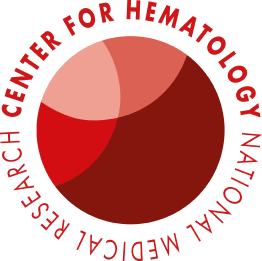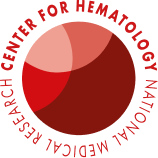
The head of the department is hematologist of the first qualification category, Maxim V. Soloviev, Candidate of Medical Sciences.
The department functions as part of the Division of Chemotherapy of Paraproteinemic Hemoblastosis.
The department was established in 2012 as a part of the Department of High-Dose Hemoblastosis Chemotherapy and Bone Marrow Transplantation. For several years, the staff of the two departments worked together in the field of implementing transplantation techniques in various diseases of the oncohematological profile and increasing activity in the treatment of multiple myeloma. During those years, the division was headed by Doctor of Medical Sciences, Professor L P. Mendeleeva.
In 2018, the Department of Hematology and Chemotherapy of Paraproteinemic Hemoblastoses with a Bone Marrow and Hematopoietic Stem Cell Transplantation Unit moved to newly renovated premises and has 22 specialized hematology beds, including 1-bed, 2-bed and 4-bed wards.
List of diseases and syndromes with which patients can be referred for examination and treatment:
- symptomatic multiple myeloma;
- smoldering myeloma;
- monoclonal gammapothy of undetermined significance;
- monoclonal gammapothy of clinical (organ) significance;
- plasma cell leukemia;
- solitary plasmocytoma;
- plasmoblastic lymphoma;
- Waldenstrom's macroglobulinemia;
- AL amyloidosis;
- POEMS-syndrome;
- heavy chain deposition disease;
- * other rare forms of the disease occurring with the secretion of pathological immunoglobulins.
The main objectives of the clinical and research activities of the department are to work in the field of modern diagnostics and intensive therapy of paraproteinemic hemoblastoses, including high—dose chemotherapy followed by transplantation of autologous and allogeneic stem cells, as well as to study the effectiveness of the latest targeted (with a biological mechanism of action on tumor cells) drugs in plasma cell tumors. All clinical activities are aimed at improving the survival and quality of life of patients. The purpose of the division is to provide quality medical care to patients based on national and international clinical guidelines and standards.
Together with highly professional staff of various laboratories of the NMRC for Hematology, the department conducts highly informative diagnostics of plasma cell tumors, including all necessary laboratory and imaging techniques: clinical and biochemical blood tests, immunochemical (electrophoresis and immunofixation) blood and urine tests, cytological, histological, immunohistochemical bone marrow and plasmocytoma studies, molecular genetic and immunophenotypic studies of tumor cells, computed tomography (low-dose of the entire skeleton) and magnetic resonance imaging of the whole body.
The initial (induction) stage of therapy is performed with the latest targeted drugs, taking into account the age, comorbidity of the patient, and relief of infectious and toxic manifestations. The transplantation stage of treatment includes the mobilization and collection of autologous stem cells with their subsequent transplantation under high-dose chemotherapy. The goal of autologous transplantation is the minimization of the tumor in order to ensure long—term remission of the disease.
Every year, the department performs about 100 autologous stem cell transplants for multiple myeloma as part of the provision of high-tech medical care for citizens of the Russian Federation, as well as citizens of foreign countries on a contractual basis.
Our department is the only one in the Russian Federation that performs auto-transplantation to patients with multiple myeloma undergoing programmed hemodialysis for myeloma nephropathy.
Patients with prognostically unfavorable clinical and molecular signs of the course of the disease are transplanted with allogeneic stem cells from a related donor.
Timely identification of the bacterial and/or viral pathogen, and an adequately selected antimicrobial therapy regimen contribute to minimizing the risks associated with complications of the early post-transplant period.
One of the promising areas of the departments's work is the creation of a differentiated strategy for the supportive treatment of patients with multiple myeloma after autologous stem cell transplantation, taking into account minimal residual disease and biological risk factors.
The staff of the department take an active part in international and domestic clinical trials, studying the efficacy and safety of the latest registered and unregistered medicines in the Russian Federation used for the treatment of paraproteinemic hemoblastoses. These studies provide clinical experience and opportunities to overcome tumor resistance in patients with recurrent myeloma.
In 2015, the department initiated a multicenter population-based study of the incidence and evaluation of the results of treatment of multiple myeloma in Russia. The study included more than 3,500 patients with multiple myeloma from 41 regions of the Russian Federation. The analysis of the obtained data demonstrated both difficulties and successes in achieving long-term results of treatment of patients against the background of modern therapeutic possibilities.
The staff of the department annually conduct more than 200 consultations within the framework of providing medical care using telemedicine technologies where diagnostic and therapeutic issues are discussed and the algorithm and timing of transplantation in NMRC for Hematology are clarified.
The staff of the department regularly improve on their professionalism by participating in educational webinars and scientific and practical conferences, in Russian and international symposiums. They publish scientific articles, defend dissertations, and are authors and co-authors of National Clinical Guidelines for the diagnosis and treatment of paraproteinemic hemoblastoses.
DEPARTMENT STAFF
Nonna K. Arutyunyan - hematologist
Alexandra V. Abakumova - hematologist
Elizaveta A. Mamayeva- hematologist
Anton A. Startsev - hematologist
Anastasia A. Dimitrenko - senior nurse





